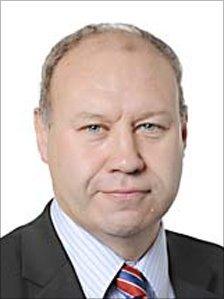Wales 'will not miss out' on substantial EU funding
- Published

Derek Vaughan says poorer parts of Wales will still benefit from EU aid
The European Commission recently set out its vision for the EU's budget of just over ÔéČ1 trillion for the next round of Euro funding - this represents a 5% increase compared to the last framework.
But what will this mean for Wales - a net beneficiary of EU funding?
Structural funds have assisted Wales in many ways including training up the workforce, improving public services, regenerating town centres and boosting businesses.
Over recent months, questions have been raised about how the poorest regions will fare in this next round of funding - I am pleased to say that the European Commission has proposed a new transitional category for regions whose GDP is between 75% and 90% of the EU average.
In addition to this there will be transitional help for those coming out of convergence, which amounts to at least two thirds of what those regions currently receive.
It is expected that West Wales and the Valleys will remain in the convergence category post 2013, but this new transitional category will ensure that regions do not miss out on substantial amounts of funding - this is really encouraging news.
Although the two pillar system for the Common Agricultural Policy will remain, we are likely to see a different approach to agricultural spending over the next financial framework, linking it with other priorities.
"Greening" the CAP is key for the Commission; ensuring our environmental and climate change objectives are met by encouraging farmers to do their bit.
Capping payments
The Commission has also proposed capping the level of direct payments for the largest farms to make sure that smaller farms receive their fair share of funding - in addition more support and funding will be given to active farmers.
We will also see ÔéČ89.9bn pumped in to rural development over the next seven years - this money will help to improve the quality of life for those living in rural areas across Wales and is instrumental in creating a competitive and sustainable rural economy.
There can be no doubt that spending on agriculture and regional policy is hugely beneficial to Wales, and makes up a substantial part of the budget.
However, we must also recognise the millions of euros invested in infrastructure improving roads and transport links; research and innovation helping universities and businesses grow; and education and training creating better opportunities for Wales' workforce.
The details of how exactly this money is going to be spent are still up for discussion.
I will be closely involved in this process as a member of the Parliament's Budget Committee, and together with the other Welsh MEPs, will strive to get the best deal for Wales.
- Published10 August 2011